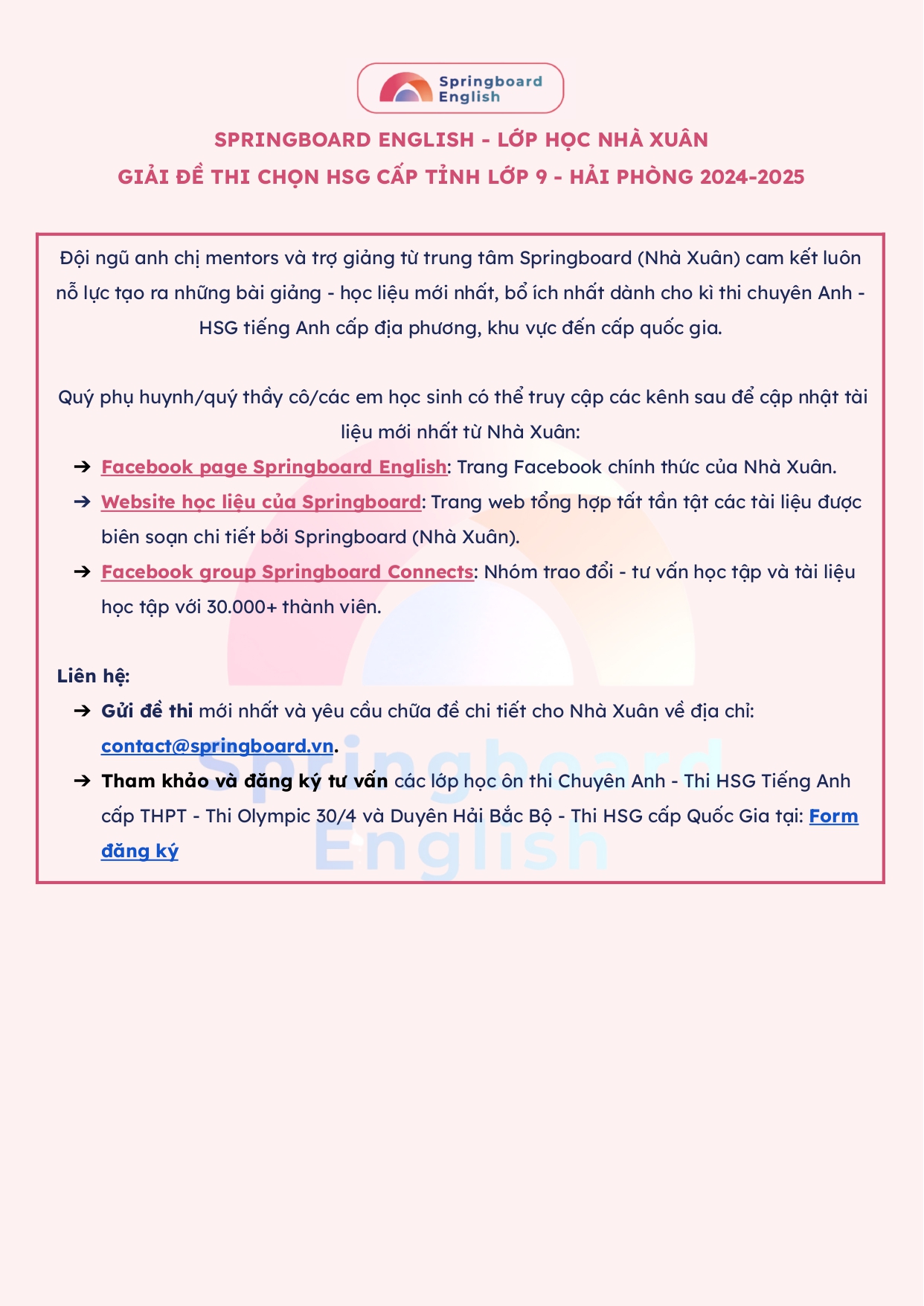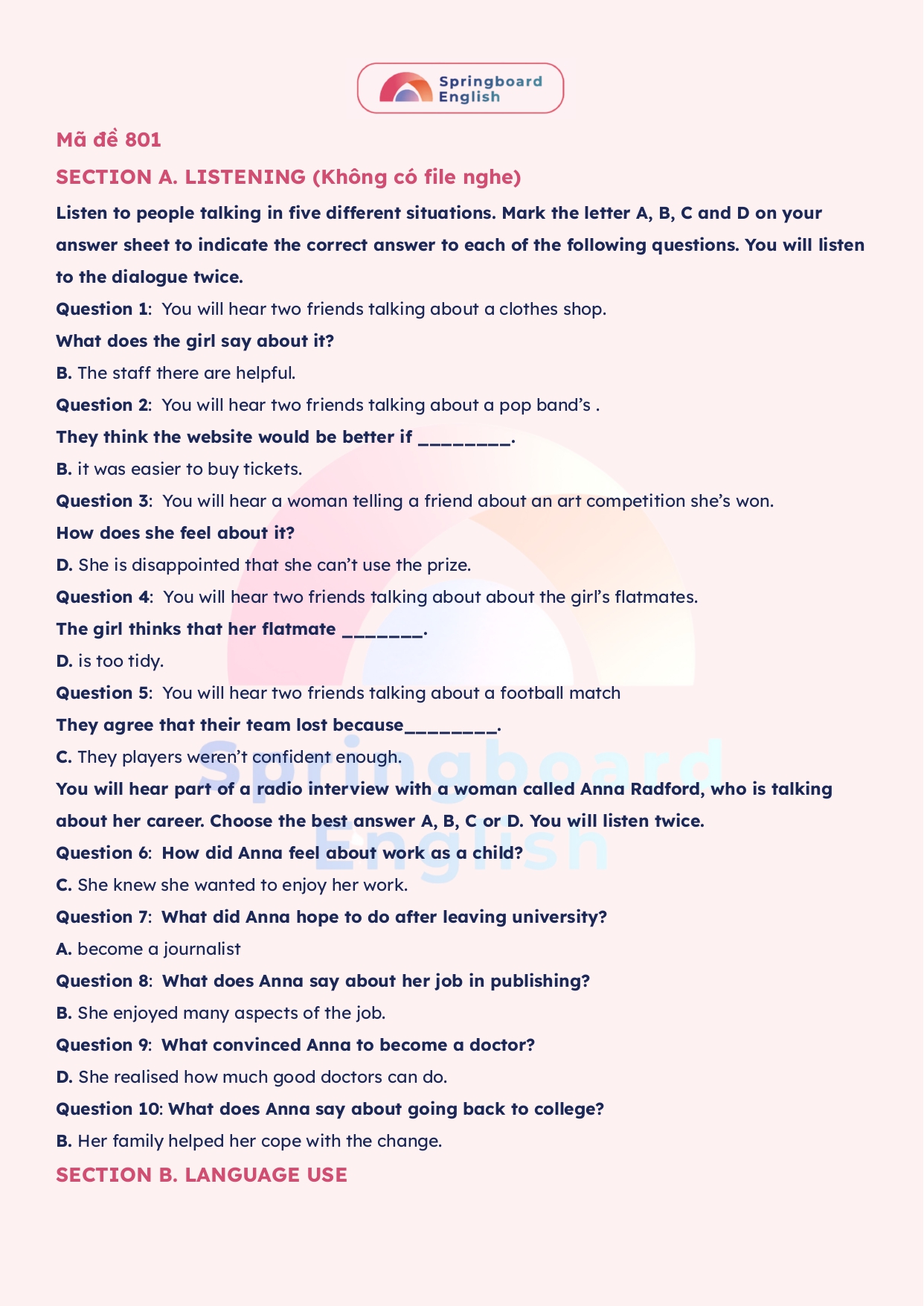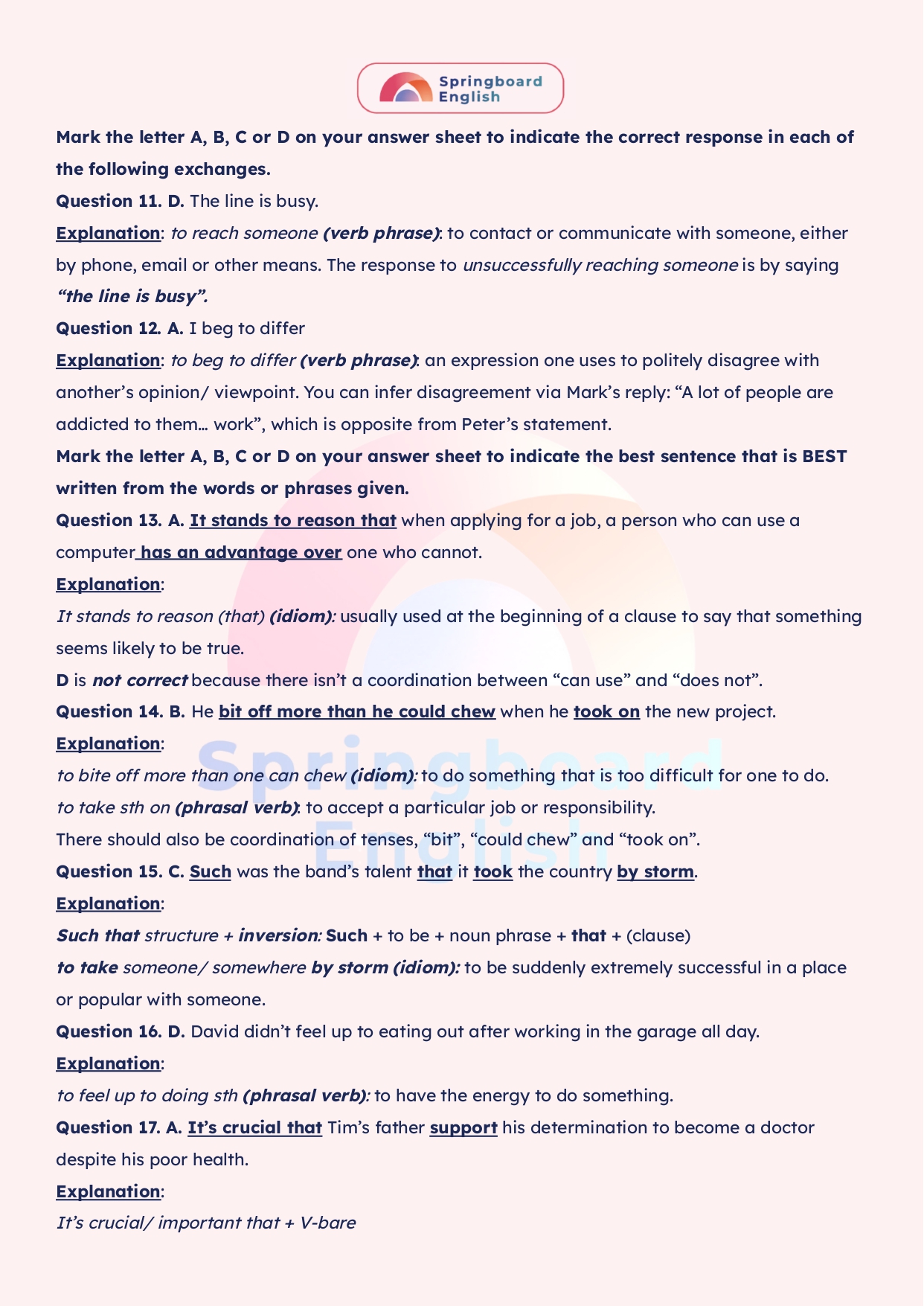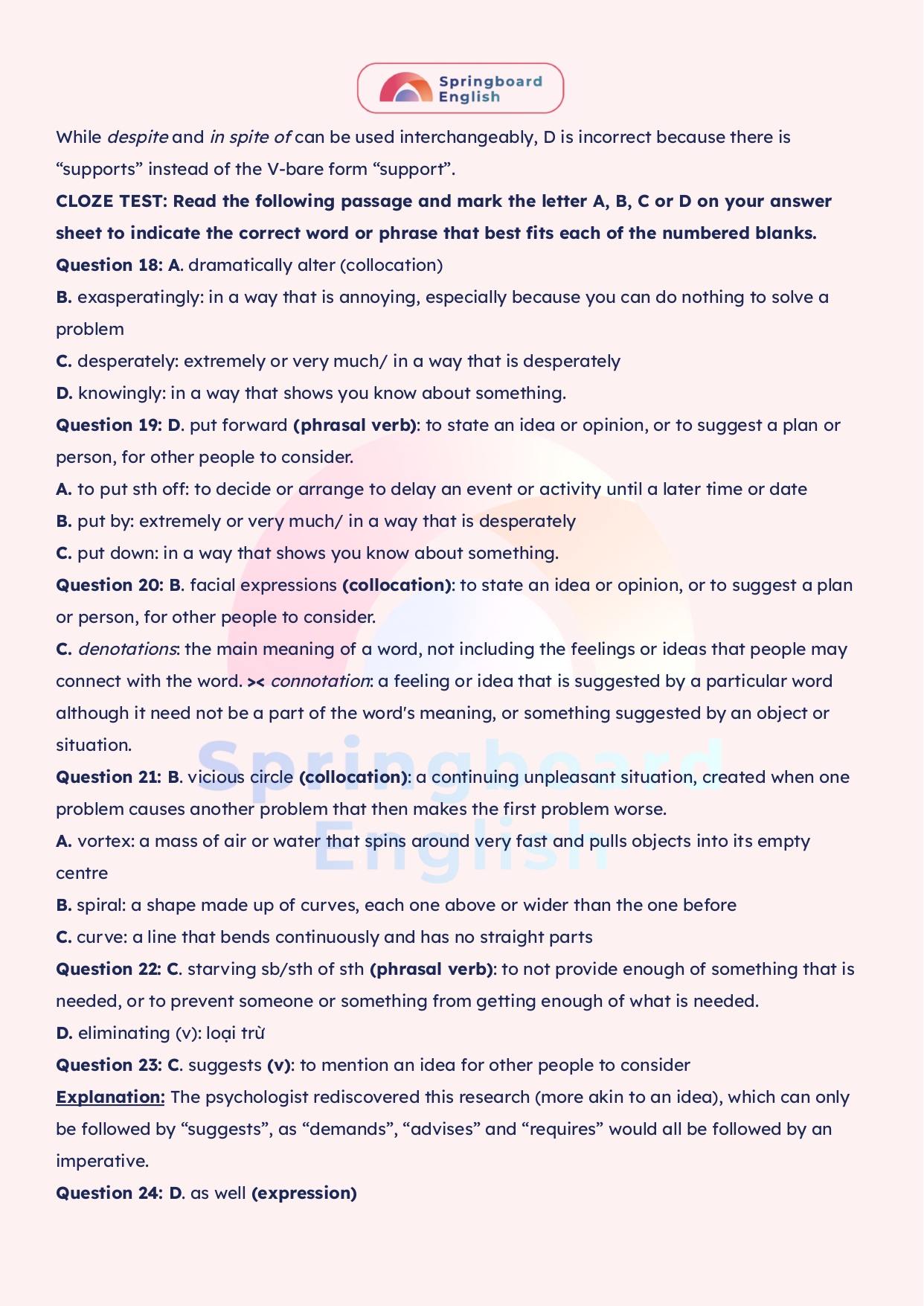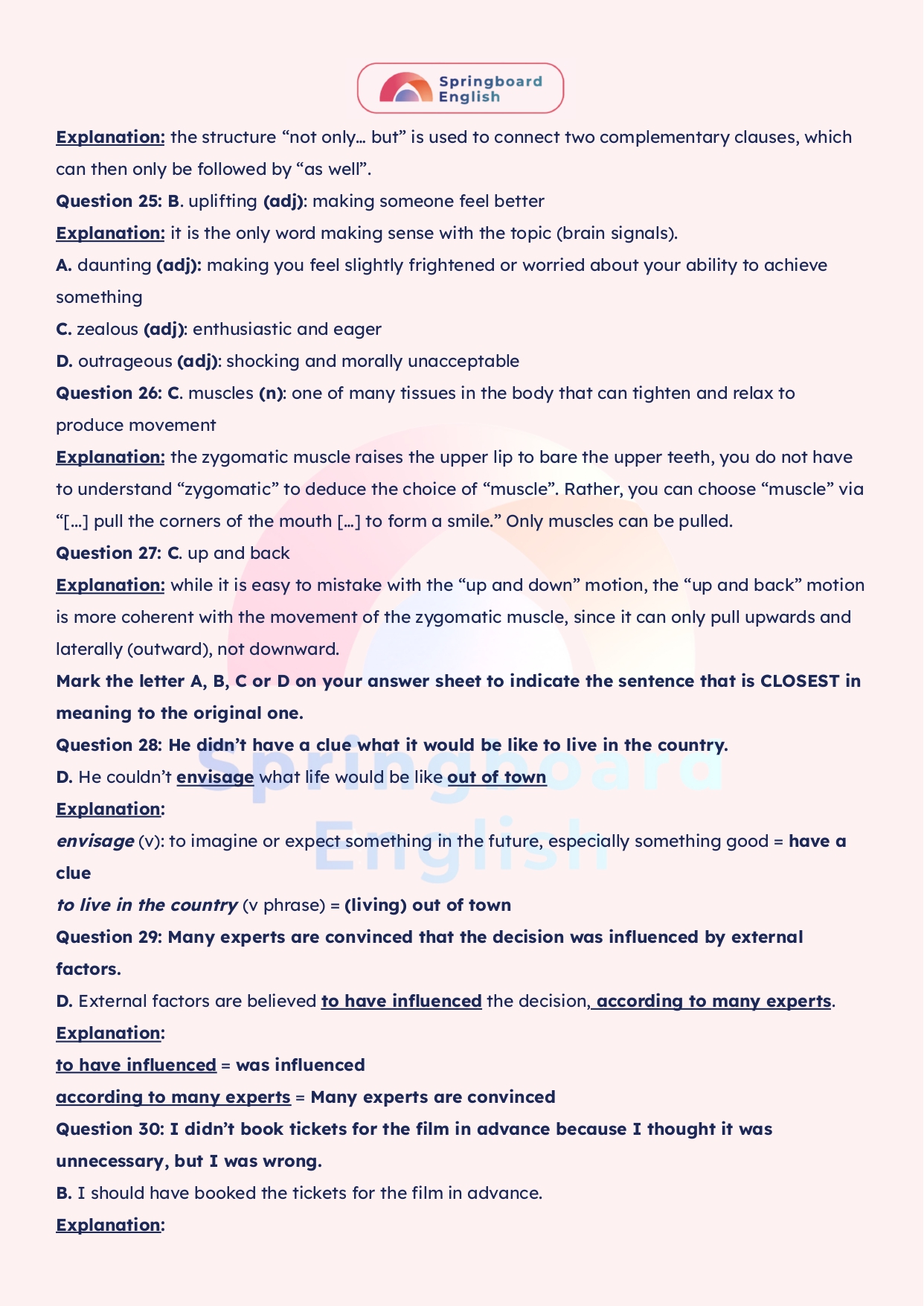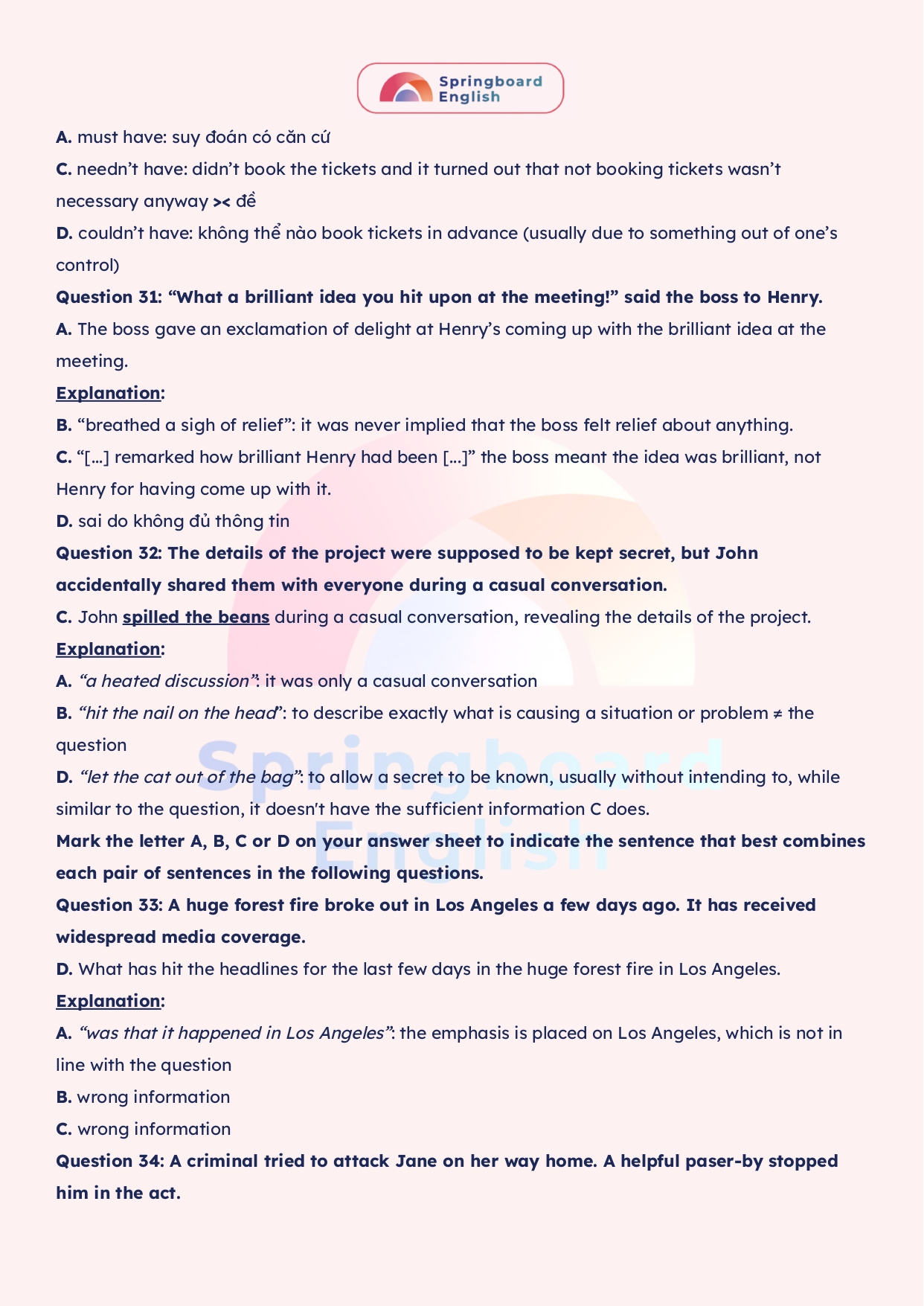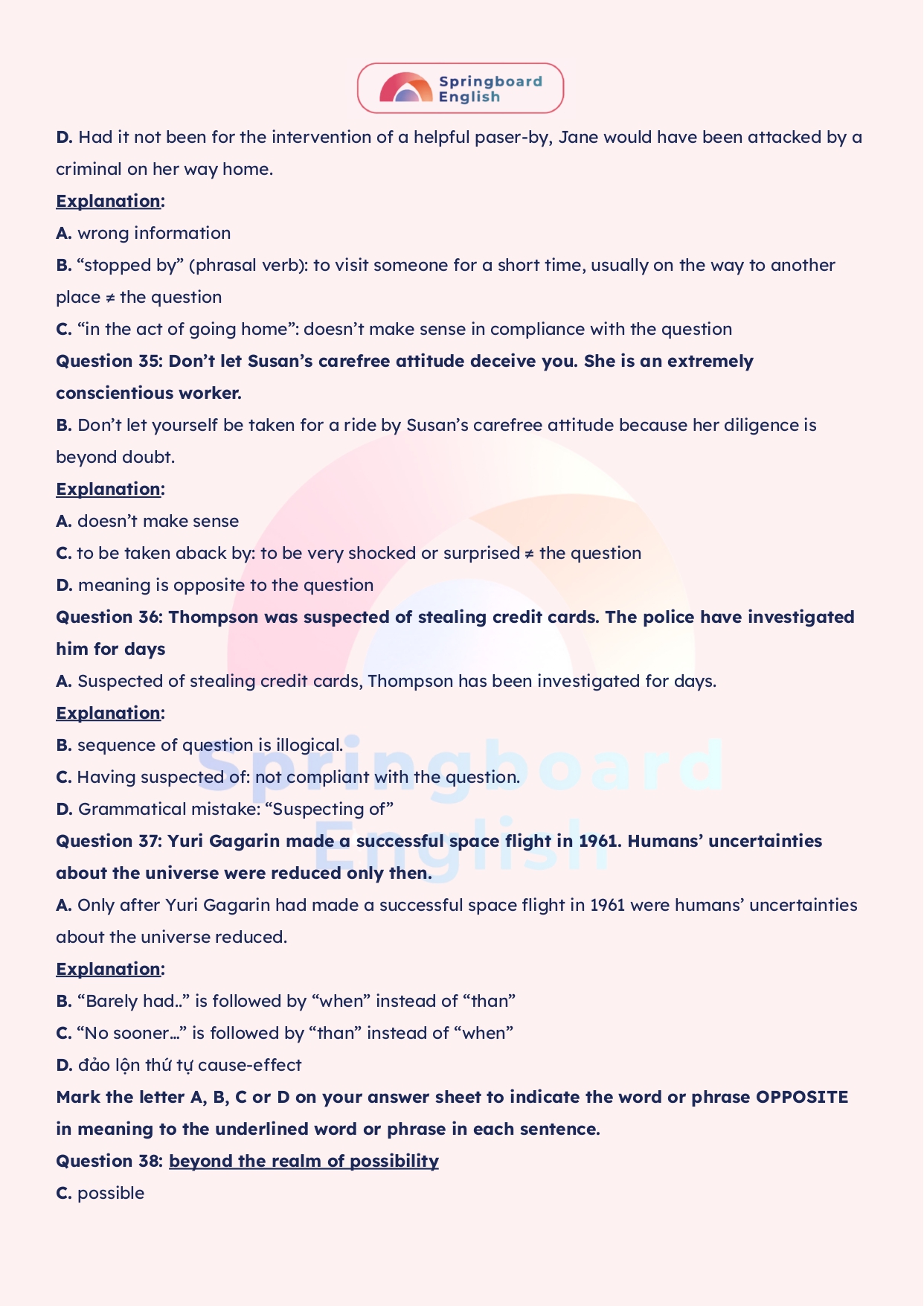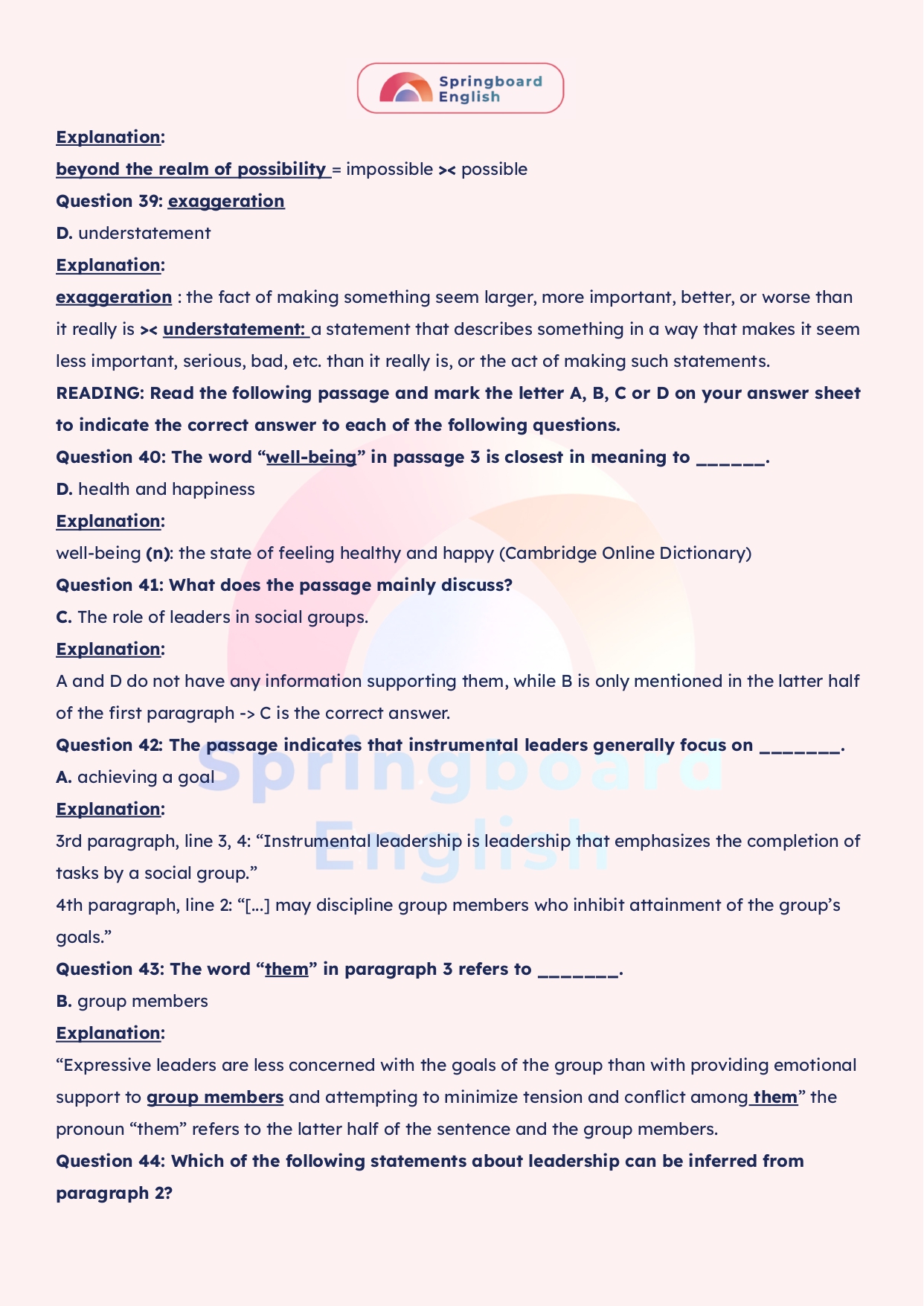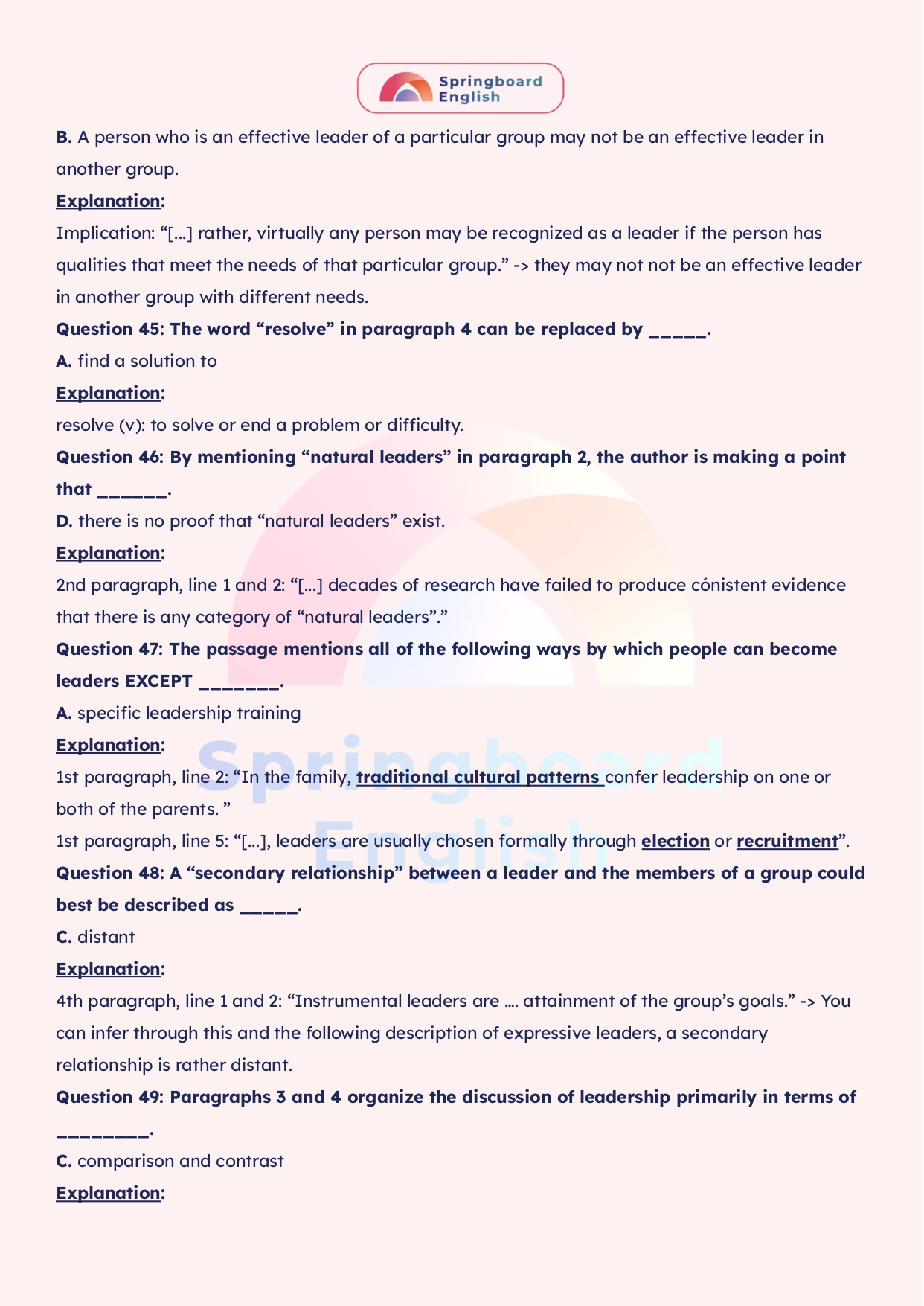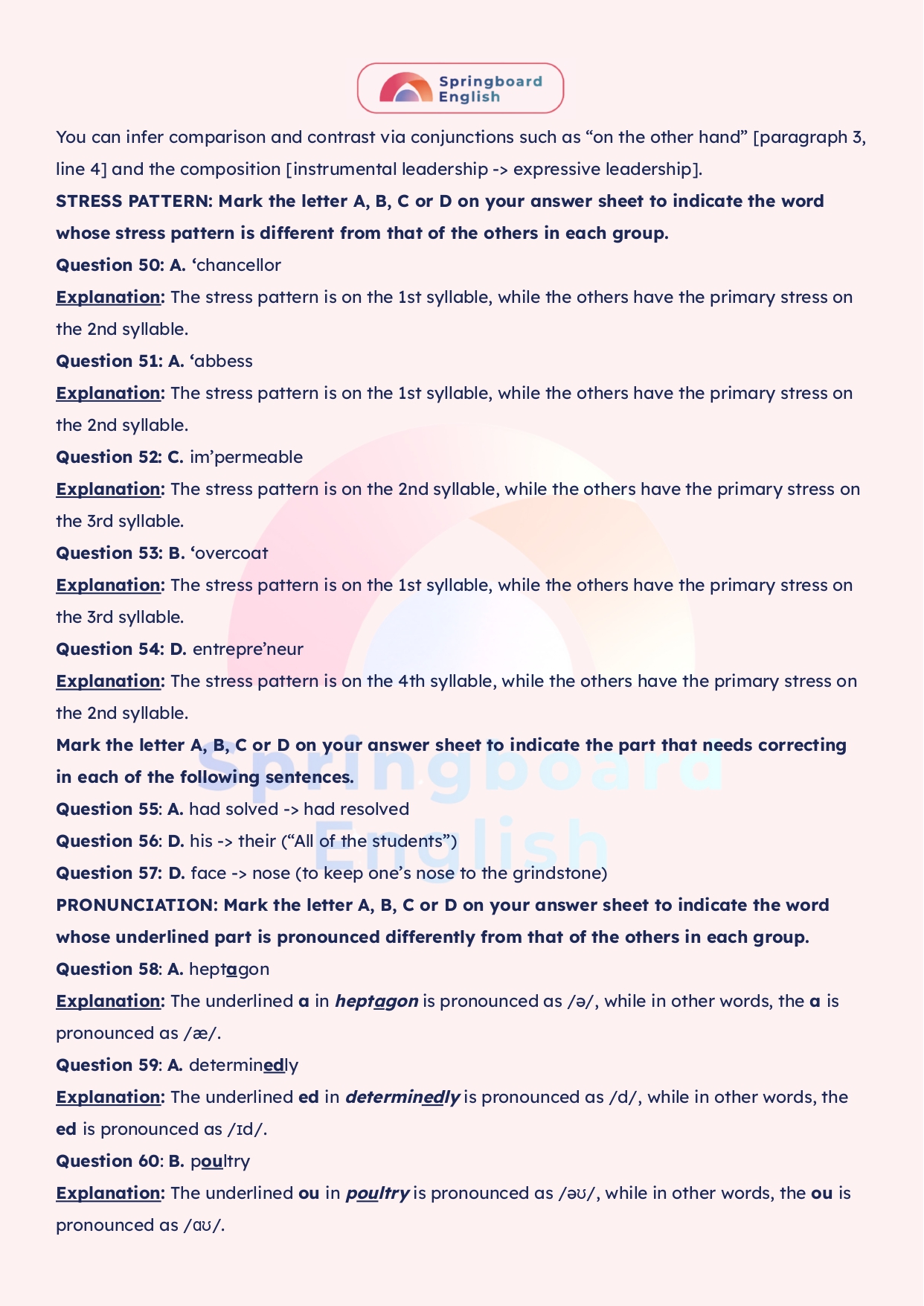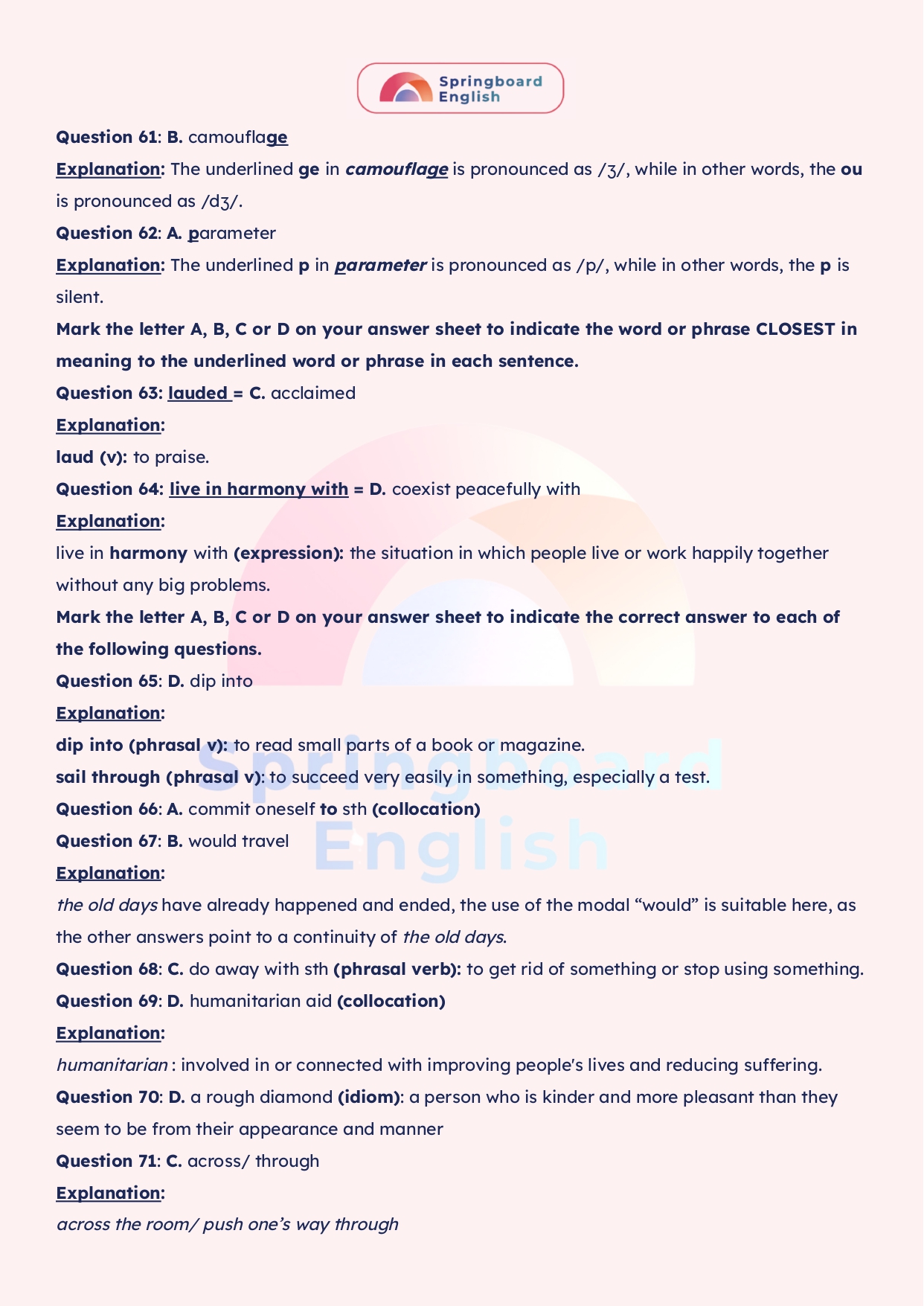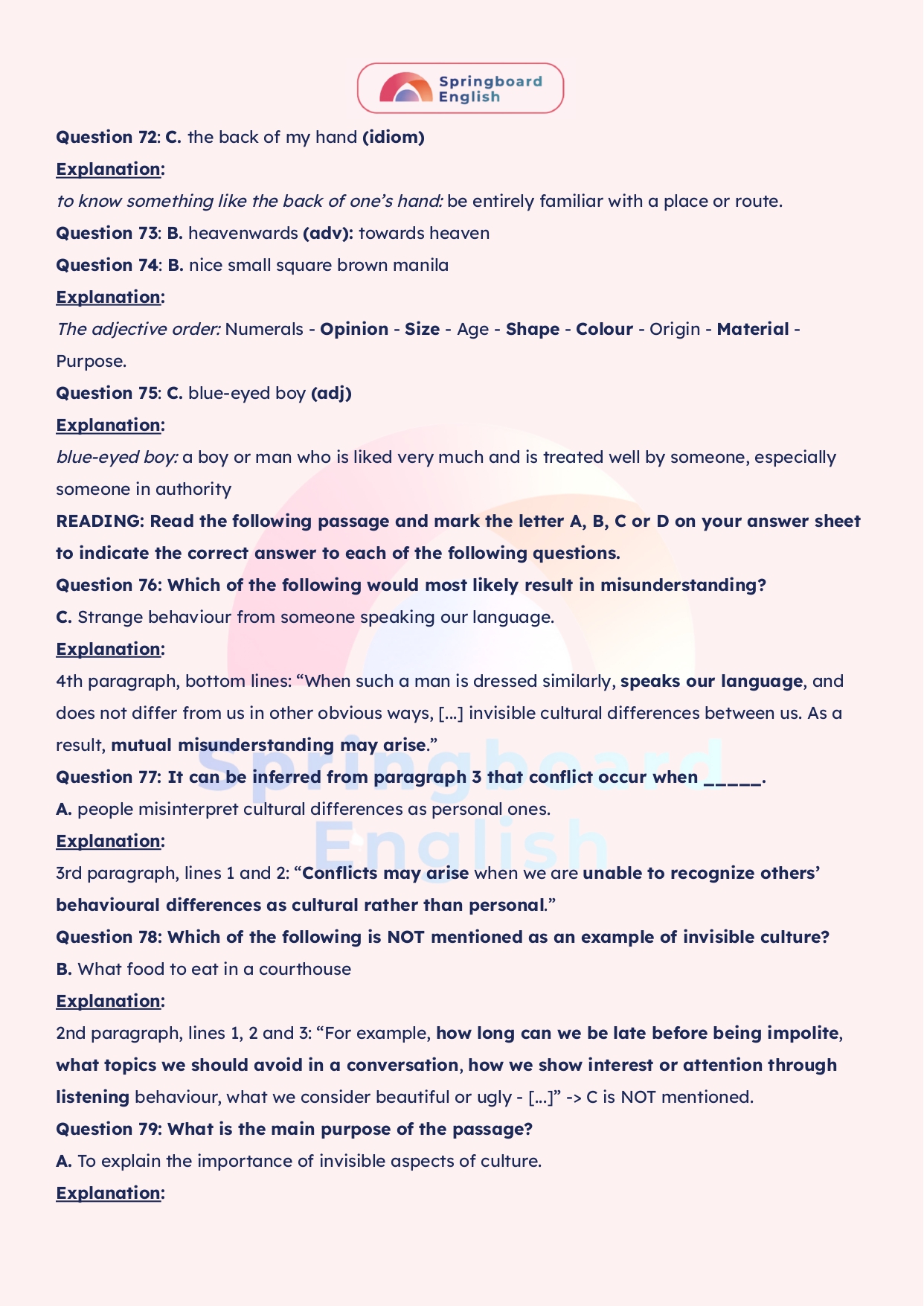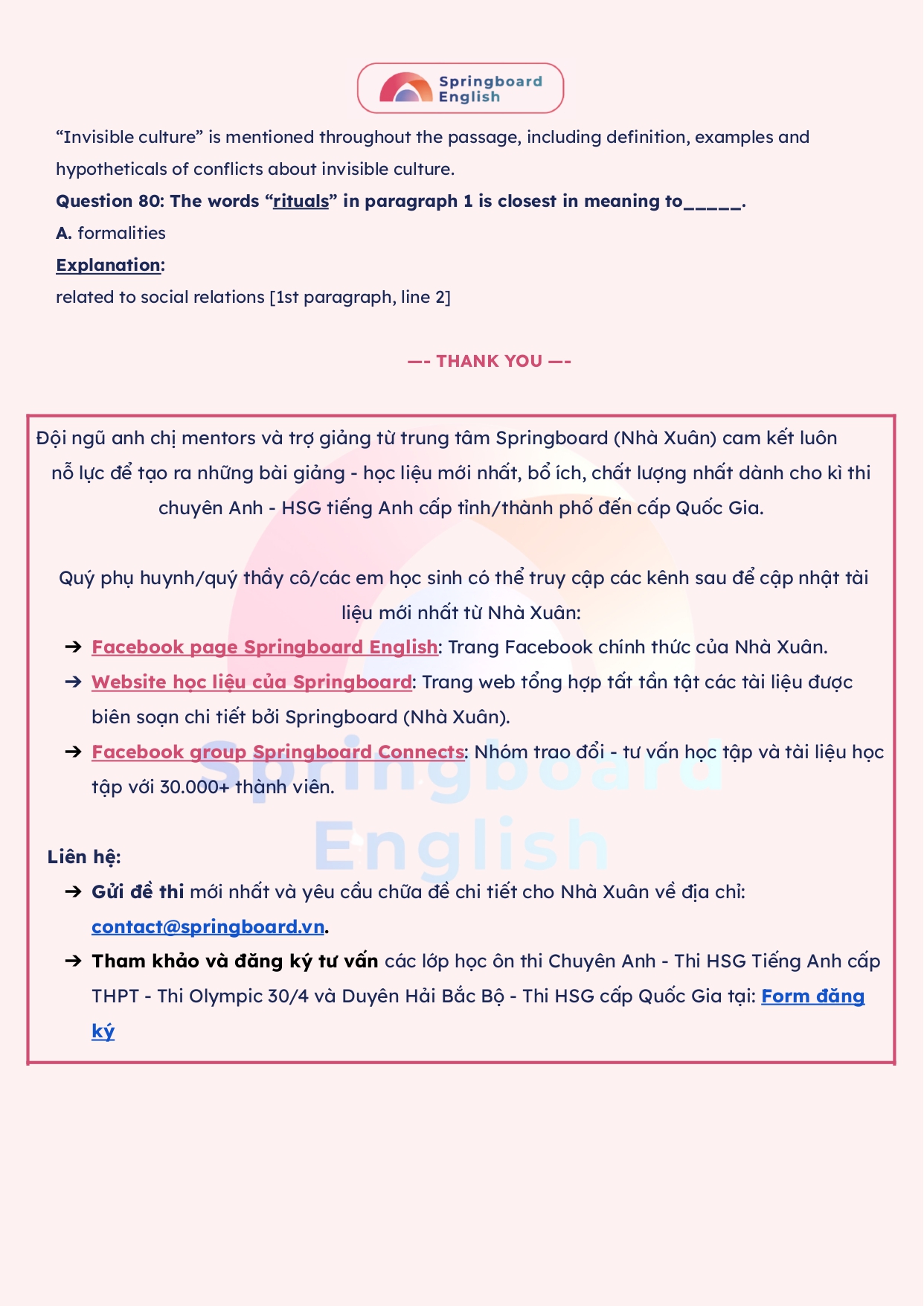Đề thi và Đáp án Chi tiết Kì thi Chọn HSG Tỉnh lớp 9 - TP Hải Phòng năm học 2024-2025
Trong bài viết này, Đội ngũ trung tâm Springboard (Nhà Xuân) xin chia sẻ đến các quý phụ huynh, thầy cô, các em học sinh Đề thi và Đáp án có giải thích chi tiết ở kì thi chọn học sinh giỏi tỉnh Tiếng Anh lớp 9 – TP Hải Phòng năm học 2024-2025.
Phần đáp án chi tiết được giới thiệu ở bài viết này là tài liệu được biên soạn trực tiếp bởi đội ngũ chuyên môn Nhà Xuân, đồng thời là bản cập nhật mới nhất trong năm 2025.
Kéo xuống dưới cùng để xem hết đáp án có giải thích chi tiết.
Đề thi HSG Tiếng Anh lớp 9 - TP Hải Phòng năm học 2024-2025
SỞ GIÁO DỤC VÀ ĐÀO TẠO
HẢI PHÒNG
(Đề thi gồm 80 câu; 10 trang)
KỲ THI CHỌN HỌC SINH GIỎI THÀNH PHỐ CẤP THCS
NĂM HỌC 2024 – 2025
ĐỀ THI MÔN: TIẾNG ANH
Listen to people talking in five different situations. Mark the letter A, B, C, or D on your answer sheet
to indicate the correct answer to each of the following questions. You will listen to each dialogue twice.
Question 1. You will hear two friends talking about a new clothes shop.
What does the girl say about it?
A. The logo on the bags is not popular.
B. The staff there are helpful.
C. Prices are reduced at the moment.
D. It only has the latest fashions.
Question 2. You will hear two friends talking about a pop band’s website.
They think the website would be better if ______.
A. the price of tickets was cheap
B. it was easier to buy concert tickets
C. its information was up to date
D. the band members answered messages
Question 3. You will hear a woman telling a friend about an art competition she’s won.
How does she feel about it?
A. She is upset that the prize isn’t valuable.
B. She seems to be excited that she has a week off.
C. She feels satisfied that the judges liked her picture.
D. She is disappointed that she can’t use the prize.
Question 4. You will hear two friends talking about the girl’s flatmate.
The girl thinks that her flatmate ______.
A. talks too much B. plays music too loud
C. is too clean and neat D. is too untidy
Question 5. You will hear two friends talking about a football match.
They agree that their team lost because ______.
A. they were missing some key players
B. the players didn’t do the right training
C. the players weren’t confident enough
D. the players were not strong
You will hear part of a radio interview with a woman called Anna Radford, who is talking about her
career. Choose the best answer A, B, C or D. You will listen twice.
Question 6. How did Anna feel about work as a child?
A. She wanted a career similar to her parents’.
B. She knew nothing about jobs.
C. She knew she wanted to enjoy her work.
D. She was determined to have a glamorous job.
Question 7. What did Anna hope to do after leaving university?
A. become a journalist B. write romantic books
C. design fashion D. study a science subject
Question 8. What does Anna say about her job in publishing?
A. She was appointed manager as soon as she started.
B. She enjoyed many aspects of the job.
C. She was displeased with the pay.
D. She found it hard to work with young people.
Question 9. What convinced Anna to become a doctor?
A. She felt sorry for people in developing countries.
B. She loved taking care of children.
C. She had been considering it for a long time.
D. She realised how much good doctors can do.
Question 10. What does Anna say about going back to college?
A. She struggled with all the difficult exams.
B. Her family helped her cope with the change.
C. She had many sweet memories there.
D. The other students treated her differently because of her age.
Mark the letter A, B, C or D on your answer sheet to indicate the correct response in each of the
following exchanges.
Question 11. The boss and his secretary are talking about the customer service.
– Boss: “Have you been able to reach that customer?”
– Secretary: “_______”
A. He’s much too high to reach.
B. Yes, I have known him for 6 years.
C. Oh, there’s no approval.
D. Oh, no. The line’s busy.
Question 12. Peter and Mark are talking about the rise of online games.
– Peter: “Playing online games on a regular basis can boost one’s creativity.”
– Mark: “_______. A lot of young people are addicted to them and then ignore their school work.”
A. I beg to differ B. Say before you think
C. I’m in agreement with your idea D. You can say that again
Mark the letter A, B, C, or D on your answer sheet to indicate the sentence that is BEST written from
the words or phrases given.
Question 13. reason / apply/ job/ person/ use/ computer/ advantage/ one/ not.
A. It stands to reason that when applying for a job, a person who can use a computer has an advantage
over one who cannot.
B. It goes beyond reason that to apply for a job, a person has to use a computer to have an advantage over
one who cannot.
C. For some reason or others, when applying for a job, a person can use a computer to have an advantage
over one who does not.
D. It opens to reason that to apply for a job, a person who can use a computer has an advantage over one
who does not.
Question 14. He/ bite/ chew/ when/ take/ new/ project.
A. He bites off more than he chews when he took up the new project.
B. He bit off more than he could chew when he took on the new project.
C. He bites more than he can chew when he takes up the new project.
D. He bit more than he could chew when he took on the new project.
Question 15. Such/ band/ talent/ take/ country/ storm.
A. Such the band’s talent was that they took the country to storm.
B. Such was the band’s talent that it took the country to storm.
C. Such was the band’s talent that it took the country by storm.
D. Such the band’s talent was it that they took the country by storm.
Question 16. David/ not/ feel/ eat out/ work/ garage/ all day.
A. David didn’t feel for eating out after working at the garage all day.
B. David didn’t feel like to eat out before working in the garage all day.
C. David didn’t feel free about eating out before working at the garage all day.
D. David didn’t feel up to eating out after working in the garage all day.
Question 17. It/ crucial/ Tim/ father/ support/ determination/ become/ doctor/ poor health.
A. It’s crucial that Tim’s father support his determination to become a doctor despite his poor health.
B. It’s crucial that Tim’s father supported his determination to becoming a doctor regardless of his
poor health.
C. It’s crucial for Tim’s father to support his determination to becoming a doctor in spite of his
poor health.
D. It’s crucial that Tim’s father supports his determination to become a doctor on account of his
poor health.
Read the following passage and mark the letter A, B, C, or D on your answer sheet to indicate the
correct word or phrase that best fits each of the numbered blanks.
The expression on your face can actually (18)______ alter your feelings and perceptions, and it has been
proved that deliberately smiling or frowning can create corresponding emotional responses. The idea was
first (19)______ by a French physiologist, Israel Waynbaum, in 1906. He believed that different facial
(20)______ affected the flow of blood to the brain, and this could create positive or negative feelings. A
happy smile or irrepressible laughter increased the blood flow and contributed to joyful feelings. But sad, angry expressions decreased the flow of oxygen-carrying blood, and created a vicious (21)______ of gloom
and depression by effectively (22)______ the brain of essential fuel.
Psychologist Robert Zajonc rediscovered this early research, and (23)______ that the temperature of the
brain could affect the production and synthesis of neurotransmitters which definitely influence our moods
and energy levels. He argues that an impaired blood flow could not only deprive the brain of oxygen, but
create further chemical imbalance by inhibiting vital hormonal messages (24)______. Zajonc goes on to
propose that our brains remember that smiling is associated with being happy, and that by deliberately
smiling through your tears, you can persuade your brain to release (25)______ neurotransmitters – replacing
a depressed condition with a happier one. People suffering from psychosomatic illness depression and
anxiety states could benefit from simply exercising their zygomatic (26)______ which pull the corners of the
mouth (27)______ to form a smile, several times an hour.
Question 18. A. dramatically B. exasperatingly C. desperately D. knowingly
Question 19. A. put off B. put by C. put down D. put forward
Question 20. A. appearances B. expressions C. denotations D. looks
Question 21. A. vortex B. circle C. spiral D. curve
Question 22. A. cutting B. removing C. starving D. eliminating
Question 23. A. demands B. requires C. suggests D. advises
Question 24. A. thereby B. instead C. as much D. as well
Question 25. A. daunting B. uplifting C. zealous D. outrageous
Question 26. A. bones B. nerves C. muscles D. veins
Question 27. A. here and there B. up and down C. up and back D. now and then
Mark the letter A, B, C, or D on your answer sheet to indicate the sentence that is CLOSEST in
meaning to the original one.
Question 28. He didn’t have a clue what it would be like to live in the country.
A. Little could he visualize his life away from the hinterland.
B. Country life seemed to be in the dark for most people but him.
C. Living in the urban areas was completely out of his mind.
D. He couldn’t envisage what life would be like out of town.
Question 29. Many experts are convinced that the decision was influenced by external factors.
A. External factors are believed to have influenced the decision, according to many experts.
B. Many experts believe that external factors were said to influence the decision.
C. The decision was believed by many experts to have been influenced by external factors.
D. The decision is said to be influenced by external factors, according to many experts.
Question 30. I didn’t book tickets for the film in advance because I thought it was unnecessary, but I
was wrong.
A. I must have booked tickets for the film in advance.
B. I should have booked tickets for the film in advance.
C. I needn’t have booked tickets for the film in advance.
D. I couldn’t have booked tickets for the film in advance.
Question 31. “What a brilliant idea you hit upon at the meeting!” said the boss to Henry.
A. The boss gave an exclamation of delight at Henry’s coming up with a brilliant idea at the meeting.
B. The boss breathed a sigh of relief with the brilliant idea Henry made at the meeting.
C. The boss remarked how brilliant Henry had been at the meeting for finding out the idea.
D. The boss exclaimed that Henry came up with a brilliant idea at the meeting.
Question 32. The details of the project were supposed to be kept secret, but John accidentally shared
them with everyone during a casual conversation.
A. John tried to keep the details of the project under wraps but failed to do so during a heated discussion.
B. John hit the nail on the head by pointing out the most essential details of the project.
C. John spilled the beans during a casual conversation, revealing the details of the project.
D. John let the cat out of the bag when bringing up the details of the project.
Mark the letter A, B, C, or D on your answer sheet to indicate the sentence that best combines each
pair of sentences in the following questions.
Question 33. A huge forest fire broke out in Los Angeles a few days ago. It has received widespread
media coverage.
A. What has kept the huge forest fire in the headlines for a few days was that it happened in Los Angeles.
B. That the forest in Los Angeles is on fire has covered the headlines for the last few days.
C. That the huge forest fire in Los Angeles has received widespread media coverage happened a few
days ago.
D. What has hit the headlines for the last few days is the huge forest fire in Los Angeles.
Question 34. A criminal tried to attack Jane on her way home. A helpful passer-by stopped him in the
act.
A. If Jane hadn’t got in the criminal’s way home, a helpful passer-by would have been attacked.
B. If a helpful passer-by hadn’t stopped by, Jane would have been attacked by a criminal on her
way home.
C. A passer-by intervened just when a criminal was trying to attack Jane in the act of going home.
D. Had it not been for the intervention of a helpful passer-by, Jane would have been attacked by a
criminal on her way home.
Question 35. Don’t let Susan’s carefree attitude deceive you. She is an extremely conscientious worker.
A. Don’t let yourself be taken in by Susan’s carefree attitude due to her conscience.
B. Don’t let yourself be taken for a ride by Susan’s carefree attitude because her diligence is beyond
doubt.
C. Don’t let yourself be taken aback by Susan’s carefree attitude as she is an extremely conscientious
worker.
D. Don’t let the fact that Susan is an extremely conscientious worker deceive you as she is a careless
person.
Question 36. Thompson was suspected of stealing credit cards. The police have investigated him
for days.
A. Suspected of stealing credit cards, Thompson has been investigated for days.
B. Thompson has been investigated for days, suspected to have stolen credit cards.
C. Having suspected of stealing credit cards, Thompson has been investigated for days.
D. Suspecting of having stolen credit cards, Thompson has been investigated for days.
Question 37. Yuri Gagarin made a successful space flight in 1961. Humans’ uncertainties about the
universe were reduced only then.
A. Only after Yuri Gagarin had made a successful space flight in 1961 were humans’ uncertainties about
the universe reduced.
B. Barely had Yuri Gagarin made a successful space flight in 1961 than humans’ uncertainties about the
universe were reduced.
C. No sooner had Yuri Gagarin successfully flown into space in 1961 when humans’ uncertainties about
the universe were reduced.
D. Not until humans’ uncertainties about the universe were reduced did Yuri Gagarin make a successful
space flight in 1961.
Mark the letter A, B, C or D on your answer sheet to indicate the word or phrase OPPOSITE in
meaning to the underlined word or phrase in each sentence.
Question 38. A successful outcome is not beyond the realms of possibility once you get everything
in hand.
A. untouchable B. certain C. possible D. impossible
Question 39. The producer reckoned over 50,000 people attended the concert but that was a slight
exaggeration.
A. overestimation B. undertaking C. overemphasis D. understatement
Read the following passage and mark the letter A, B, C, or D on your answer sheet to indicate the
correct answer to each of the following questions.
According to sociologists, there are several different ways in which a person may become recognized as
the leader of a social group in the United States. In the family, traditional cultural patterns confer leadership
on one or both of the parents. In other cases, such as friendship groups, one or more persons may gradually
emerge as leaders, although there is no formal process of selection. In larger groups, leaders are usually
chosen formally through election or recruitment.
Although leaders are often thought to be people with unusual personal ability, decades of research have
failed to produce consistent evidence that there is any category of “natural leaders”. It seems that there is no
set of personal qualities that all leaders have in common; rather, virtually any person may be recognized as a
leader if the person has qualities that meet the needs of that particular group.
Furthermore, although it is commonly supposed that social groups have a single leader, research suggests
that there are typically two different leadership roles that are held by different individuals. Instrumental
leadership is leadership that emphasizes the completion of tasks by a social group. Group members look to
instrumental leaders to get things done. Expressive leadership, on the other hand, is leadership that
emphasizes the collective well-being of a social group’s members. Expressive leaders are less concerned
with the overall goals of the group than with providing emotional support to group members and attempting
to minimize tension and conflict among them. Group members expect expressive leaders to maintain stable
relationships within the group and provide support to individual members.
Instrumental leaders are likely to have a rather secondary relationship to other group members. They give
orders and may discipline group members who inhibit attainment of the group’s goals. Expressive leaders
cultivate a more personal or primary relationship to others in the group. They offer sympathy when someone
experiences difficulties or is subjected to discipline, are quick to lighten a serious moment with humor, and
try to resolve issues that threaten to divide the group. As the differences in these two roles suggest,
expressive leaders generally receive more personal affection from group members; instrumental leaders, if
they are successful in promoting group goals, may enjoy a more distant respect.
Question 40. The word “well-being” in paragraph 3 is closest in meaning to ______.
A. finance and luck B. success and wealth
C. comfort and prosperity D. health and happiness
Question 41. What does the passage mainly discuss?
A. How individuals train to become leaders
B. How leadership differs in small and large groups
C. The role of leaders in social groups
D. The problems faced by leaders
Question 42. The passage indicates that instrumental leaders generally focus on ______.
A. achieving a goal
B. identifying new leaders
C. ensuring harmonious relationships
D. sharing responsibility with group members
Question 43. The word “them” in paragraph 3 refers to ______.
A. expressive leaders B. group members
C. goals of the group D. tension and conflict
Question 44. Which of the following statements about leadership can be inferred from paragraph 2?
A. Most people desire to be leaders but can produce little evidence of their qualifications.
B. A person who is an effective leader of a particular group may not be an effective leader in another
group.
C. A person can best learn how to be an effective leader by studying research on leadership.
D. Few people succeed in sharing a leadership role with another person.
Question 45. The word “resolve” in paragraph 4 can be replaced by ______.
A. find a solution to B. concentrate on
C. think about D. show ignorance of
Question 46. By mentioning “natural leaders” in paragraph 2, the author is making a point that
______.
A. “natural leaders” are easily accepted by the members of a social group
B. “natural leaders” share a similar set of characteristics
C. few people qualify as “natural leaders”
D. there is no proof that “natural leaders” exist
Question 47. The passage mentions all of the following ways by which people can become leaders
EXCEPT ______.
A. specific leadership training B. traditional cultural patterns
C. formal election process D. recruitment
Question 48. A “secondary relationship” between a leader and the members of a group could best be
described as ______.
A. informal B. unreliable C. distant D. supplementary
Question 49. Paragraphs 3 and 4 organize the discussion of leadership primarily in terms of ______.
A. narration of events
B. cause and effect analysis
C. comparison and contrast
D. examples that illustrate a problem
Mark the letter A, B, C, or D on your answer sheet to indicate the word whose stress pattern is
different from that of the others in each group.
Question 50. A. chancellor B. inveigle C. fiasco D. lieutenant
Question 51. A. abbess B. fatigue C. converge D. bedaub
Question 52. A. inarticulate B. crematorium C. impermeable D. acrimonious
Question 53. A. overact B. overcoat C. overcharge D. overhear
Question 54. A. untrustworthy B. significant C. indigenous D. entrepreneur
Mark the letter A, B, C, or D on your answer sheet to indicate the part that needs correcting in each of
the following sentences.
Question 55. After their long-standing dispute had solved, the two families decided to bury the hatchet.
A. had solved B. hatchet C. long-standing D. bury
Question 56. All of the students in this course will be assessed according to his attendance, performance and
hard work.
A. All of the students B. performance
C. according to D. his
Question 57. If you want to meet the deadline, you’ll need to keep your face to the grindstone and stay
focused.
A. meet B. stay C. grindstone D. face
Mark the letter A, B, C or D on your answer sheet to indicate the word whose bold and underlined
part is pronounced differently from that of the others in each group.
Question 58. A. heptagon B. jacaranda C. anesthetic D. canal
Question 59. A. determinedly B. wickedly C. allegedly D. wretchedly
Question 60. A. council B. poultry C. foundry D. slouch
Question 61. A. mileage B. camouflage C. beverage D. voyage
Question 62. A. parameter B. pneumonia C. receipt D. psychology
Mark the letter A, B, C, or D on your answer sheet to indicate the word or phrase CLOSEST in
meaning to the underlined word or phrase in each sentence.
Question 63. Albert Einstein is lauded as one of the greatest theoretical physicists of all time.
A. described B. dictated C. acclaimed D. ordained
Question 64. Let us stop the degradation of the planet’s natural environment and create a future in which
humans live in harmony with nature.
A. fall in love with B. cooperate with
C. agree with D. coexist peacefully with
Mark the letter A, B, C, or D on your answer sheet to indicate the correct answer to each of the
following questions.
Question 65. She had just enough time to ______ the report before the conference.
A. carry out B. sail through C. fall for D. dip into
Question 66. Jack’s friend advised him to think carefully about committing himself ______ taking out
a mortgage.
A. to B. from C. for D. on
Question 67. I’d love to have lived in the old days, when people ______ to the market by horse and carriage.
A. were always travelling B. would travel
C. had been travelling D. would be travelling
Question 68. We intend to ______ the old system as soon as we have developed a better one.
A. get round to B. come down on C. do away with D. run up against
Question 69. The International Committee of the Red Cross has sent ______ aid to many countries all over
the world since its establishment in 1863 in Geneva, Switzerland.
A. inhumanely B. humanity C. humanization D. humanitarian
Question 70. My new neighbour appears rather unfriendly, but actually he’s a rough ______.
A. stone B. pearl C. rock D. diamond
Question 71. Suddenly seeing Sue _______ the room, Hans pushed his way ______ the crowd to get to her.
A. across/across B. over/through C. across/through D. over/along
Question 72. Don’t worry about getting lost as I know this town like ______.
A. the knee of my leg B. the toes on my foot
C. the back of my hand D. the ring on my finger
Question 73. I cast my eyes ______ and saw the geese flying in a V line.
A. heavenlike B. heavenwards C. heavenly D. heaven-sent
Question 74. Did you see the ______ envelope?
A. nice small manila square brown B. nice small square brown manila
C. nice manila small square brown D. nice small square manila brown
Question 75. Being his parents’ ______ boy, Tom is always given anything he wants.
A. red-handed B. wide-eyed C. blue-eyed D. high-handed
Read the following passage and mark the letter A, B, C, or D on your answer sheet to indicate the
correct answer to each of the following questions.
In most discussions of cultural diversity, attention has focused on visible, explicit aspects of culture, such
as language, dress, food, religion, music and social rituals. Although they are important, these visible
expressions of culture, which are taught deliberately and learned consciously, are only the tip of the iceberg
of culture. Much of culture is taught and learned implicitly, or outside awareness. Thus, neither cultural
insiders or cultural outsiders are aware that certain “invisible” aspects of their culture exist.
Invisible elements of culture are important to us. For example, how long we can be late before being
impolite, what topics we should avoid in a conversation, how we show interest or attention through listening
behaviour, what we consider beautiful or ugly – these are all aspects of culture that we learn and use without
being aware of it. When we meet other people whose invisible cultural assumptions differ from those we
have learned implicitly, we usually do not recognize their behaviour as cultural in origin.
Differences in invisible culture can cause problems in cross-cultural relations. Conflicts may arise when
we are unable to recognize others’ behavioural differences as cultural rather than personal. We tend to
misinterpret other people’s behaviour, blame them, or judge their intentions or competence without realizing
that we are experiencing cultural rather than individual differences.
Formal organizations and institutions, such as schools, hospitals, workplaces, governments, and legal
systems are collection sites for invisible cultural differences. If the differences were more visible, we might
have less misunderstanding. For example, if we met a man in a courthouse who was wearing exotic clothes,
speaking a language other than ours, and carrying food that looked strange, we would not assume that we
understood his thoughts and feelings or that he understood ours. Yet when such a man is dressed similarly to
us, speaks our language, and does not differ from us in other obvious ways, we may fail to recognize the
invisible cultural differences between us. As a result, mutual misunderstanding may arise.
Question 76. Which of the following would most likely result in misunderstanding?
A. Exotic clothes worn by foreigners
B. Strange behaviour from someone speaking a foreign language
C. Strange behaviour from someone speaking our language
D. Unusual food cooked by foreign visitors
Question 77. It can be inferred from paragraph 3 that conflicts occur when ______.
A. people misinterpret cultural differences as personal ones
B. one culture is more visible than another culture
C. people compete with those from other cultures
D. some people recognize more cultural differences than others
Question 78. Which of the following is NOT mentioned as an example of invisible culture?
A. What topics to avoid in a conversation
B. What food to eat in a courthouse
C. How people express interest in what others are saying
D. How long we can be late before being considered impolite
Question 79. What is the main purpose of the passage?
A. To explain the importance of invisible aspects of culture
B. To describe cultural diversity
C. To give examples of cross-cultural conflict
D. To point out that much of culture is learned consciously
Question 80. The word “rituals” in paragraph 1 is closest in meaning to ______.
A. assumptions B. aspects C. cultures D. formalities
—— HẾT ——
File PDF - Đề thi HSG Tiếng Anh lớp 9 TP Hải Phòng năm học 2024-2025
File PDF đề thi
Lời kết
Cảm ơn quý phụ huynh, thầy cô, và các em học sinh đã tham khảo tài liệu được biên soạn bởi Nhà Xuân.
Với nỗ lực để luôn tạo ra những bài giảng – học liệu hay nhất dành cho kì thi chuyên Anh – HSG tiếng Anh cấp tỉnh/thành phố đến cấp Quốc Gia, đội ngũ mentors trung tâm Springboard (Nhà Xuân) luôn biên soạn những tài liệu mới nhất với giải thích tận tâm – chi tiết.
Quý phụ huynh/ quý thầy cô/các em học sinh có thể truy cập các kênh sau để cập nhật tài liệu mới nhất từ Nhà Xuân:
- Facebook page Springboard English: Trang Facebook chính thức của Nhà Xuân
- Facebook group Springboard Connects: Nhóm trao đổi – tư vấn học tập, và tài liệu học tập với 30.000+ thành viên
- Website học liệu – springboard.vn :Trang web tổng hợp tất tần tật các tài liệu được biên soạn chi tiết bởi Springboard (Nhà Xuân).
Liên hệ:
- Gửi đề thi mới nhất cho Nhà Xuân về địa chỉ: contact@springboard.vn
- Tham khảo và đăng ký tư vấn các lớp học ôn thi Chuyên Anh – Thi HSG Tiếng Anh cấp THPT – Thi Olympic 30/4 và Duyên Hải Bắc Bộ – Thi HSG cấp Quốc Gia tại: Form đăng ký tư vấn.
Thân ái,
Đội ngũ trung tâm Springboard (Nhà Xuân)



